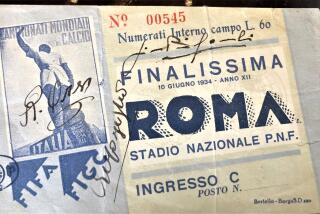Hooligans Beware: Italian ‘Big Brother’ Is Watching
- Share via
MILAN, Italy — Somewhere out of sight, “Big Brother” is watching World Cup fans and players.
Hidden television cameras allow security forces to monitor every seat in the stadiums and secretly photograph troublemakers. Computers mounted in squad cars link police patrols with command center data banks, and yet another device can receive pictures of suspected hooligans transmitted from headquarters.
Soccer and the Computer Age have collided head-on at the World Cup.
“The stadiums will be under control minute by minute,” said Carlo Porceddu, the head of security for the World Cup organizing committee in Cagliari, Sardinia.
He said every seat in every one of the 12 stadiums can be monitored by closed-circuit television. Police watching on monitors can zoom in on disturbances, photograph the troublemakers and send security forces to the section.
Just to buy tickets for any of the 52 matches, spectators had to give organizers personal particulars that police, with the help of a computer, can use to identify troublemakers photographed by the stadium security systems.
Authorities in the World Cup countries have also helped Italian police compile computerized files on potentially violent fans. Customs agents can use the information to turn back some people at the borders or airports, and police can use it to identify and follow suspected soccer hooligans.
Through the computers and Telephoto machines installed in police cars, officers in the field can also have direct access to the files.
The World Cup’s use of technology also extends to policing the games. Technicians at a sports medicine center laboratory in Rome will use such instruments as gas chromatographs, mass spectrometers and liquid-crystal chromatographs to test selected players for the illegal use of drugs.
Argentine supporters, wearing white and blue scarves, toured downtown Milan hours before the kickoff of today’s opening game with Cameroon. Some bars and cafes displayed signs announcing that no alcoholic beverages will be sold.
Milan city officials imposed the ban on match days to reduce risks of rowdiness. Rome, Cagliari, Palermo and Bari are among the 12 host cities that have also announced bans on alcohol sales for match days.
More than 3,000 police and hundreds of other order-keepers were on duty around the stadium to check spectators and confiscate items that could be used as weapons.
Traffic jams were reported in downtown Milan as security forces temporarily closed large areas to private traffic to protect movement of dignitaries in Milan for the World Cup inauguration.
Milan police announced a ban on political demonstrations on the day of the cup opener.
More to Read
Sign up for Essential California
The most important California stories and recommendations in your inbox every morning.
You may occasionally receive promotional content from the Los Angeles Times.










